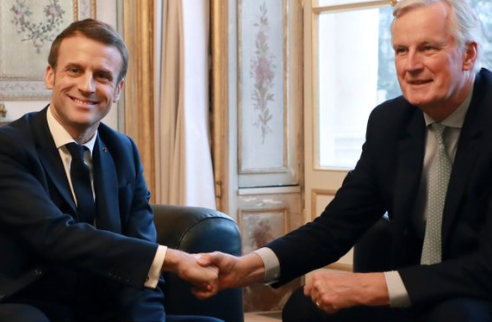After a prolonged period of uncertainty, French President Emmanuel Macron has named Michel Barnier as the new prime minister, a move aimed at bringing stability to the government following the snap elections held between June and July, which resulted in a hung parliament. Barnier, a 73-year-old former foreign minister who is best known for his role as the European Union’s Brexit negotiator, now faces a turbulent political landscape, with analysts predicting his grip on power will be fragile at best. His tenure may depend on the support of Marine Le Pen’s eurosceptic, anti-immigration National Rally (RN), which emerged as the largest single party in the newly elected National Assembly.
Thousands Protest Across France After Macron Appoints Michel Barnier as Prime Minister https://t.co/w1fEoJ3q87
— C•TN (@CTN_CZ) September 7, 2024
Macron’s decision to appoint Barnier, a conservative, has sparked outrage among left-wing factions, particularly since the left-wing coalition, which emerged as the largest political bloc after the elections, had been expecting a more inclusive government. Although the left bloc did not secure an outright majority, many felt that Macron had bypassed them unfairly by choosing a conservative prime minister. This frustration culminated in mass protests on Saturday, with over 100,000 demonstrators taking to the streets across France to express their anger. Protesters accused Macron of executing a “power grab,” arguing that his decision ignored the political will of many French voters.
Marine Le Pen, who leads the National Rally, addressed reporters on Sunday, denying claims that she had discussed Barnier’s appointment with Macron in a phone call. She quipped, “I am not Macron’s head of human resources,” making it clear that her party had no intention of being part of the new cabinet. However, Le Pen did offer her party’s support for holding referendums on key national issues such as immigration, healthcare, and security, suggesting that direct votes from the people would be the best way to address these pressing concerns. She went on to assert that if the French people continue to be ignored or mistreated, her party would not hesitate to push for a no-confidence motion against the government.
Le Pen’s party is likely to keep a close eye on Barnier’s actions, and she hinted that France might face new legislative elections within a year. “France needs a clear majority,” Le Pen remarked, signaling that the current political deadlock could be short-lived if the government fails to maintain public support. The left-wing coalition, which had backed economist Lucie Castets for the prime minister position, has also vowed to challenge Barnier’s leadership through a no-confidence motion. Macron had rejected Castets for the role, arguing that she would struggle to survive a confidence vote in such a divided parliament.
Despite the political turmoil, a recent poll conducted by Ifop revealed that a narrow majority of the French public is cautiously supportive of Barnier’s appointment. According to the poll, 52% of respondents said they were satisfied with Barnier taking on the role of prime minister, although a significant portion of the population expressed doubts about how long he would be able to remain in power. In fact, 74% of those surveyed believe that Barnier’s time as prime minister will be short-lived due to the fragile political situation.
Barnier, the oldest prime minister in modern French history, is widely regarded as competent, with 62% of respondents describing him as skilled, and 61% appreciating his willingness to engage in dialogue. Furthermore, 60% of those polled found him to be likable. Nonetheless, Barnier’s age and the complex political environment leave many questioning whether he can successfully navigate the challenges ahead.
Macron Appoints Conservative Michel Barnier as Prime Minister Amid Political Tensions in France#Politics #newsalert #ChinaD #PANORA https://t.co/z2l8xwkaAV
— PANORA HQ (@PanoraApp) September 7, 2024
The Ifop poll also highlighted that Barnier’s predecessor, Gabriel Attal, had enjoyed similar public approval when he was appointed prime minister earlier in the year. Attal, at just 34, became France’s youngest-ever prime minister in January but ultimately failed to secure a stable majority.
As the dust settles on Barnier’s appointment, France remains on edge, with both left-wing forces and Le Pen’s National Rally ready to challenge his government at the first sign of instability. With Macron calling for calm and Barnier attempting to build bridges across the political spectrum, the next few months will determine whether France can find a path forward or whether fresh elections will once again be on the horizon.
Key Points:
i. Macron appointed Michel Barnier, a former foreign minister and EU Brexit negotiator, as France’s prime minister following snap elections that resulted in a hung parliament.
ii. Barnier’s position is fragile, with potential reliance on support from Marine Le Pen’s National Rally, sparking protests from left-wing factions.
iii. Over 100,000 demonstrators protested Macron’s decision, accusing him of a “power grab” by bypassing the left-wing coalition in favor of a conservative prime minister.
iv. Le Pen denied involvement in the appointment but called for referendums on key national issues and warned of a potential no-confidence motion.
v. A recent poll showed cautious support for Barnier, but 74% of respondents believe his time in office will be short due to the unstable political climate.
RM Tomi – Reprinted with permission of Whatfinger News


